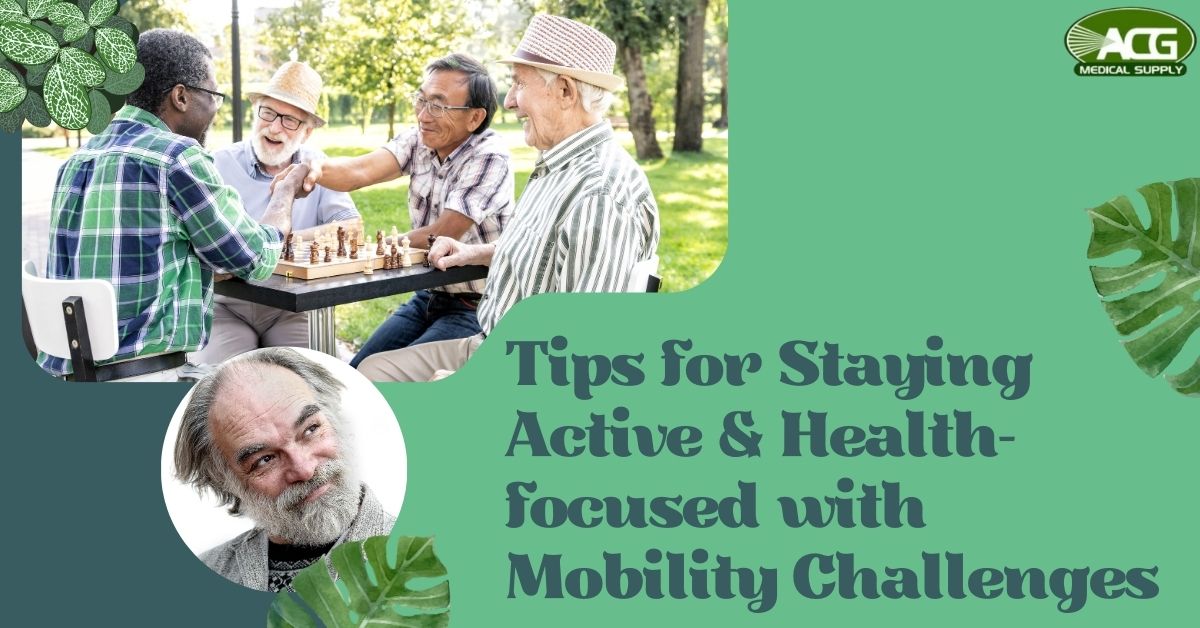Mobility challenges can make staying active and healthy feel like an uphill battle. Whether due to age, injury, or a chronic condition, these challenges often require adjusting how you approach physical activity and overall wellness. However, with the right tools, mindset, and support, it’s entirely possible to maintain independence, mental health, and physical well-being.
In this guide, we’ll explore practical tips for those navigating life with mobility challenges, with a focus on maintaining both physical and mental health.
Embracing physical activity with mobility aids
One of the biggest hurdles people with mobility impairments face is finding safe and effective ways to stay active. Physical activity for seniors, especially those with limited mobility, is crucial for maintaining overall health. It helps with flexibility, strength, and balance, reducing the risk of falls and other injuries. But how do you stay active when traditional exercises are off the table?
This is where mobility aids like 4-wheel walkers & rollators come into play. These aids are designed to provide stability and support, allowing individuals to move with more confidence.
While relying on mobility aids might initially feel like a step back, these devices are designed to help you maintain your independence, and maintaining independence with mobility aids is all about finding the right tools that fit your lifestyle. Whether it’s a walker, cane, rollator, or wheelchair, these devices allow you to move around safely, reduce the risk of falls, and keep participating in the activities you love. Imagine using a rollator to comfortably stroll through a park or using a cane to navigate the grocery store with ease—these aids can make a world of difference.
Ultimately, these aids are not limitations—they are empowering tools that help you regain control over your life and stay engaged in the activities that bring you joy. With the right support, you can embrace an active, fulfilling life regardless of mobility challenges.
Mobility exercises for seniors: staying fit and safe
Once you have the right mobility aid, it’s time to focus on exercises that suit your abilities. Mobility exercises for seniors emphasize maintaining joint flexibility, muscle strength, and overall endurance without straining the body. Despite mobility challenges, various exercises can be adapted to meet your needs.
Simple, effective exercises include seated leg lifts, arm raises, ankle circles, and marching in place. These movements may seem basic, but they play a vital role in maintaining physical health. Regularly engaging in these exercises helps you stay active without overexerting yourself.
If you’re unsure where to start, consult a healthcare provider or a physical therapist who can recommend a personalized exercise plan tailored to your mobility level.
Mental health and mobility challenges
Physical health is only one piece of the puzzle. Mental health and mobility challenges often go hand in hand, as limited mobility can lead you to feel isolated, frustrated, and even depressed. It’s important to address these emotions and find healthy ways to cope.
One of the most effective ways to support mental health is by maintaining social interactions. This can be as simple as scheduling regular phone calls or video chats with family and friends, joining a support group, or participating in community activities.
Another key aspect is setting realistic goals for yourself and focusing on what you can do rather than what you can’t. These goals might be related to physical activity, such as gradually increasing your daily steps, or personal achievements, like picking up a new skill or hobby. By setting small, attainable goals, you stay motivated and maintain a positive attitude, helping you track progress and celebrate every victory along the way.
Health tips for mobility impairments
Finally, it’s all-important to follow general health tips for mobility impairments to stay as healthy as possible. This includes eating a balanced diet rich in fruits, vegetables, and lean proteins, staying hydrated, and aiming for 7-9 hours of quality sleep each night. Regular check-ups with your healthcare provider are also crucial to monitor your health and adjust your care plan as needed.
Another important thing is listening to your body—if an activity causes you pain or discomfort, stop immediately and consult with a healthcare professional. They can help you modify the activity or suggest alternative exercises so you don’t suffer any further injuries.
Conclusion
Mobility challenges might change how you go about your day, but they don’t have to stop you from living a fulfilling and active life. Whether you’re using mobility aids, doing adaptive exercises, or focusing on mental well-being, there are countless ways to keep moving forward.
ACG Medical Supply is here to support you on this journey, offering a range of products to make your daily life more comfortable and empowering. Remember, the goal is not just to stay active but to enjoy life to the fullest, regardless of the challenges you face.

